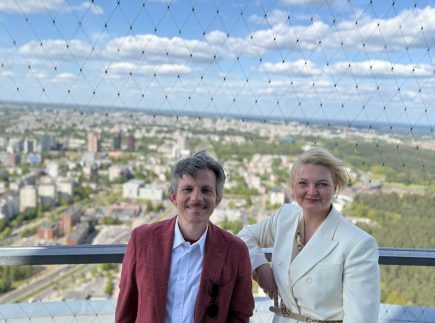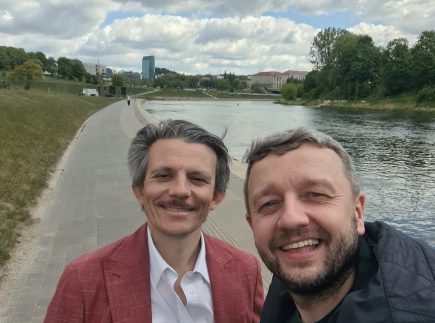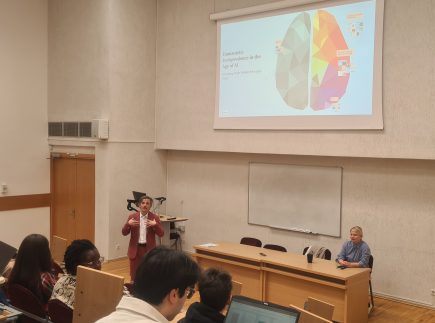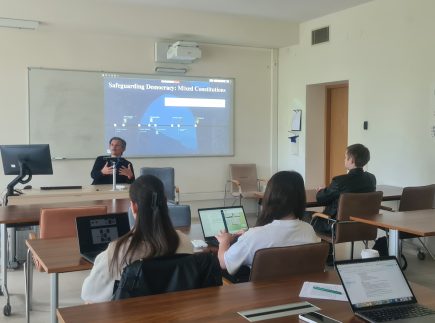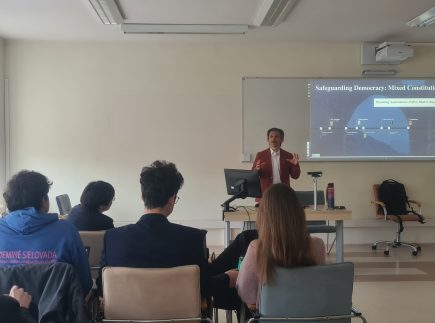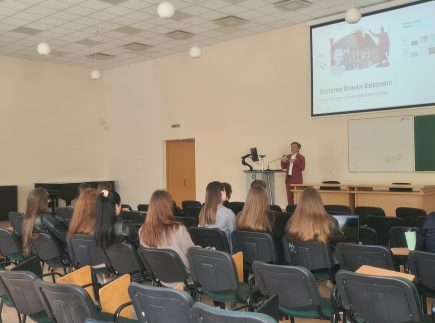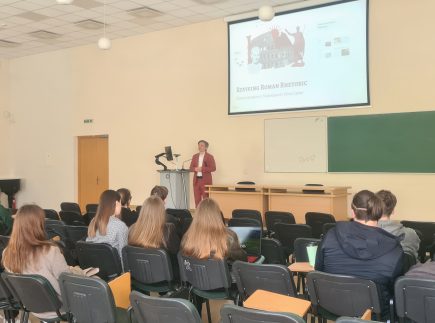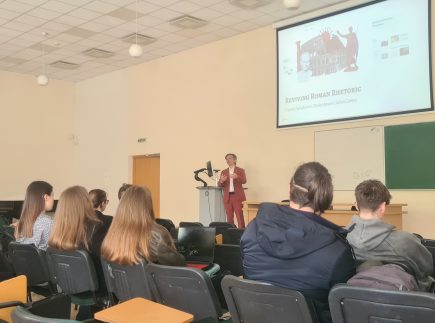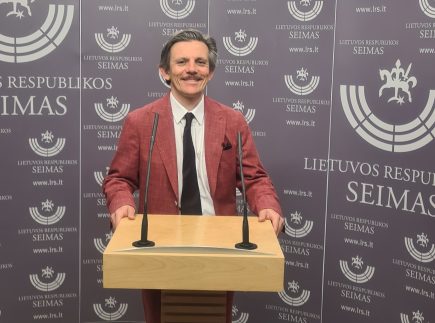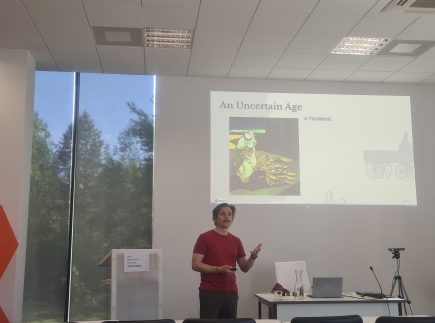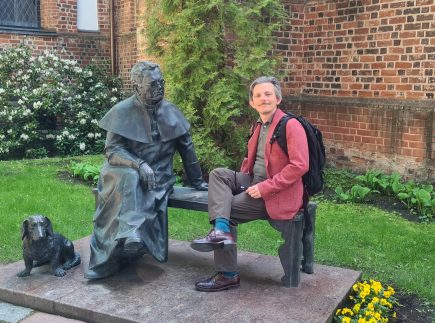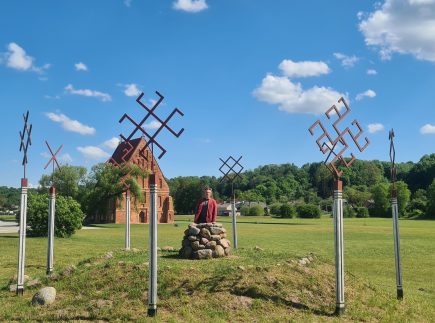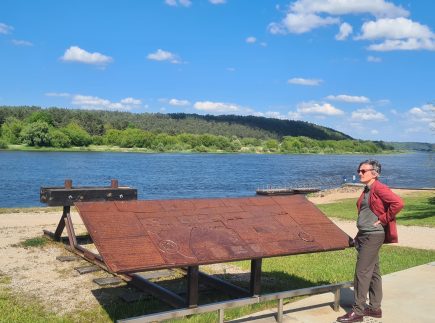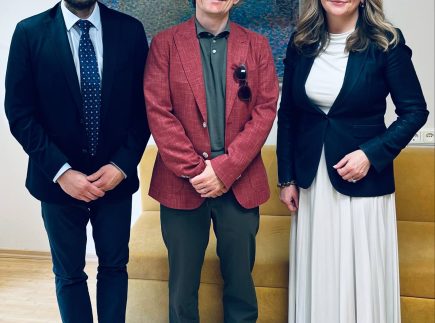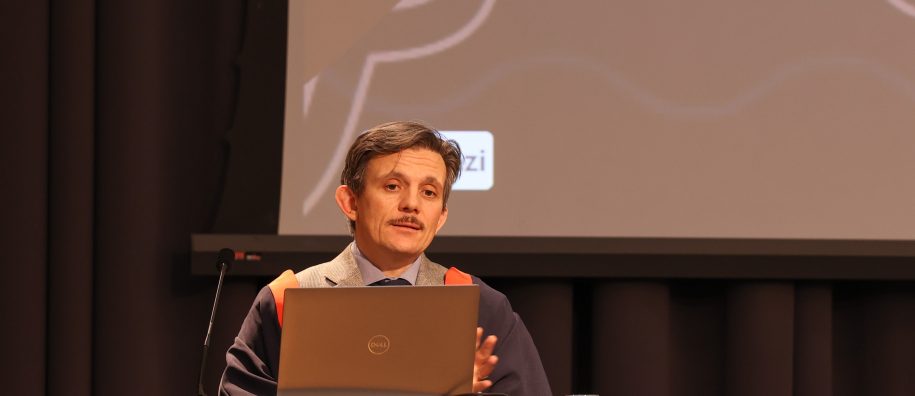
Upon his arrival at Mykolas Romeris University (MRU), Professor Dr. Lorenzo Zucca not only delivered lectures but also invited students and faculty to engage in discussions about the intersection of law, uncertainty, and human experience. A philosopher and legal scholar currently teaching at King’s College London, he offered MRU students and the academic community a unique opportunity to view law not merely as a system of rules but as a living, constantly evolving phenomenon.
Prof. Dr. L. Zucca was born in Italy, and his academic journey has taken him through Milan, Paris, Oxford, Florence, New York, and finally – London. His visit to Lithuania was part of a programme funded by Lithuanian national support scheme, during which he lectured MRU students and engaged with faculty.
His research interests include human rights, legal philosophy, constitutional law, and especially the analysis of the relationship between religion and the state. He is currently working on a project titled The Uncertainty of Will, which explores Shakespeare’s vision of power, knowledge, and human understanding.
Prof. Dr. Lorenzo Zucca is the author of several books and numerous scholarly articles. His latest book, The Poet of Uncertainty: Shakespeare on Law, Knowledge, and Power, which weaves together literature, law, and philosophy, is set to be released this year.
Prof. Dr. L. Zucca’s visit to MRU served as a reminder that a university is not only a place for the transmission of knowledge, but also a vibrant, breathing space for thought – a space where asking bold questions is just as important as seeking answers. His insights into law, uncertainty, and human responsibility in a global world resonate not only with legal scholars but with anyone who cares about freedom, critical thinking, and values.
Such visits enrich not only the student experience but also strengthen academic cooperation between countries, cultures, and ideas. And perhaps most importantly – they remind us that law, much like life itself, is rarely black and white. It is within this uncertainty that the true potential for creativity, humanity, and progress lies.
— How would you describe your experience with MRU students, study programmes, and the overall academic atmosphere? – we asked Prof. Dr. L. Zucca.
— My time at MRU was a delightful blend of intellectual rigor and human warmth. The students were sharp, curious, and wonderfully open-minded — they listened with focus, questioned with sincerity, and engaged with a spirit that made every session feel alive. The academic atmosphere struck me as both ambitious and grounded, with study programmes that are clearly designed to tackle the pressing issues of our time. There's a refreshing air of relevance, as if MRU is tuned to the present but looking resolutely toward the future.
— Could you briefly tell us what you taught during your visit and what teaching methods you used?
— I taught on Uncertainty, AI, and the Law — where we probed the implications of algorithmic systems on legal reasoning — and offered sessions on Comparative Constitutionalism, particularly focusing on how legal systems can resist authoritarian drift. A highlight was introducing my "poetic wisdom" approach to uncertainty: a method that invites students to balance logic with intuition, and precision with a sensitivity to ambiguity. I favor dialogical methods, Socratic provocation, and storytelling — the classroom becomes a little agora where we think out loud, and think together.
— What are your main academic or research interests, and did you find any potential for collaboration with MRU faculty?
— My core research orbits the gravitational pull of Uncertainty — not merely as a lack of information, but as a condition of life, of law, and of meaning-making. I'm drawn to how humans, institutions, and AI systems navigate the fog. During my visit, I had stimulating conversations with faculty, particularly with Professor Dr. Juozas Valčiukas, about the possibility of collaborating on future research. There’s clear potential, and I hope we’ll nurture it.
— Do you see any areas of synergy or shared vision for future cooperation between your home university and MRU?
— Absolutely. There’s strong potential for shared inquiry on issues such as democratic resilience, digital governance, and the ethics of emerging technologies. MRU’s dynamism and my home institution’s philosophical depth and legal focus could complement each other in beautifully unpredictable ways. Both seem committed to forging meaningful research beyond disciplinary silos — fertile ground for co-creation.
— What are your current or upcoming research projects, and how might international cooperation play a role in them?
— I'm embarking on a new project exploring Uncertainty and Security — specifically, how legal systems conceptualize risk and navigate the complex terrain of cybersecurity. This is inherently transnational work; threats ignore borders, so our thinking must too. Collaborating with international scholars, including those at MRU, could provide invaluable insights and comparative perspectives that no single jurisdiction can fully yield.
— What was your impression of Lithuania and MRU as an academic institution after this visit?
— Lithuania surprised me — in the best possible way. It’s a vibrant, forward-moving country with an impressive start-up culture that doesn’t sit in isolation, but actively interfaces with the academic world. MRU, in particular, is plugged in — intellectually and practically — and it shows. The institution feels agile, intellectually generous, and eager to build meaningful bridges across borders. I left with admiration and a touch of envy.
— What advice would you give to other colleagues considering a short-term teaching visit at MRU or elsewhere?
— Do it — and don’t bring only your slides. Bring your questions, your doubts, your half-formed thoughts. MRU offers not just students to teach, but minds to converse with. The community is welcoming and sharp, and the setting — both academic and cultural — offers a chance to be surprised, challenged, and inspired. And yes, try the food. It might not solve your research problems, but it will definitely improve your outlook on them.
